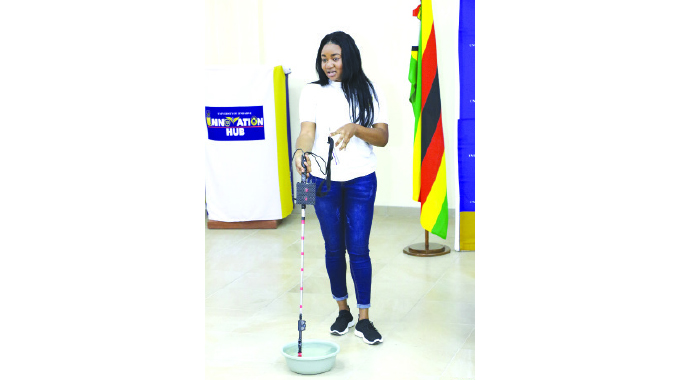Automated walking stick to improve lives of the blind

A University of Zimbabwe student has developed a new innovation — a Smart Blind Stick — which is set to assist in the development of devices that help people with visual impairments. The innovation was showcased at the University of Zimbabwe Innovation Hub. In this report, our Agric, Environment & Innovations Editor Sifelani Tsiko (ST) speaks to Tafadzwa Muusha (TM) – a Business Studies and Computer Science graduate about her innovations.
********
ST: Can you tell us briefly what the Smart Blind Stick is all about?
TM: The smart blind stick acts as an artificial vision tool used by visually impaired people. It detects physical obstacles inclusive of water. When approaching an obstacle, the stick alerts the user by vibrating and emitting alert sounds. The alert sound when approaching water is different from the alert sound when approaching any other physical obstacles. It has a tracking remote attached to a neck tag that the user carries at all times to track the stick whenever they misplace it, the remote beeps after every two minutes in-case they misplace it too.
We developed a mobile application and a web application that work in sync with the stick. The mobile app is used by the user’s guardian to track their live location, and as backup to track the users’ phone in-case they lose their walking stick. The web app is used by the users’ guardian as an alternative to the mobile app, and also used for administration purposes. The walking stick has LED lights and reflectors for night visibility and it can be customized according to users’ preference.
ST: What is the major purpose of the Smart Blind Stick? How different is this gadget from other ordinary blind sticks we have seen?
TM: The major purpose of the smart blind stick is for obstacle detection and avoidance so that the visually impaired user does not bump into obstacles. This gadget is different from other blind sticks we have seen in the sense that it detects obstacles and communicates with the user, and it has a tracking system which helps their guardian or carer locate them. The blind sticks that we have seen here in Zimbabwe do not have these functionalities.
ST: Tafadzwa, can you tell us what motivated you to develop the Smart Blind Stick?
TM: I have seen visually impaired people struggling to manoeuvre on their own with the use of the current walking canes. They have to bump into an obstacle in order to know that there is an obstacle, and sometimes they even fall. So they usually require another good-sighted person to help them manoeuvre. I then decided to come up with a solution that helps them to be mobile and independent during navigation.
ST: How do you feel about having successfully developed a Smart Blind Stick?
TM: I feel happy knowing that I have made a visually impaired person’s life better and easier with this gadget. The recent launch of the National Disability Policy for Zimbabwe which addresses the needs of persons with disabilities motivates me to develop the stick further and improve it, and I would like to extend its use to Dementia and Alzheimer’s patients. At the University of Zimbabwe, we are educated to change lives!
ST: Your application makes life easier for the visually impaired to navigate around on their own with minimum assistance. How easy is it for the visually impaired to use it? Can it be custom made to suit individual needs of people?
TM: It is easy for the visually impaired to use it, it just requires training on how to use the gadget. Yes, it can be custom made to suit individual needs of people. For example, the length of the stick should suit different people’s heights. Some may want the stick without the tracking system if they do not want other people to know their whereabouts.
ST: Smart Blind Sticks have been developed by other researchers elsewhere across the world. How different or unique is your new innovation? What makes it, to stand alone as a Zimbabwean innovation?
TM: Smart blind sticks have been developed by other researchers elsewhere across the world. What makes it stand alone as a Zimbabwean innovation is that there are currently no local manufacturers of these smart blind sticks. We are manufacturing them locally, therefore there would be no need to import the gadgets from other countries.
ST: Many people who are visually impaired find it expensive to buy and access such gadgets. What is your comment on this in relation to your gadget?
TM: Yes, many people who are visually impaired find it expensive to buy and access such gadgets. We have made a presentation to NSSA which mainly caters for this target market and l am optimistic that they will chip in. However, our engagements are still at preliminary stages and l cannot at this juncture divulge more. We also intend to engage NGOs, among others.
Read the full interview on www.herald.co.zw
ST: Is your gadget now available to the public? If not, how are you working to commercialise your application to ensure the public has access to it?
TM: The gadget is not yet available to the public. Once we get feedback from the market, the gadget will be produced and supplied to the market. Partnerships are also going to be established with public and private distributors.
ST: What will be the cost of making the Smart Blind Stick? At what price can the public expect to buy the gadget? Have you patented your innovations?
TM: We are still optimizing the production cost so that we come up with a price. We have patented the innovation.
ST: In what way do you think the UZ and the Innovation Hub centre has assisted you in developing the Smart Blind Stick? What do you think needs to be done to support young researchers like you to come up with new innovations?
TM: The University of Zimbabwe has equipped me with the knowledge and skills through learning. I owe my intellectual brilliance to the Faculty of Computer Engineering Informatics and Communications. It has educated me enough to develop the idea. And the Innovation Hub has greatly assisted me financially, in developing, improving and patenting the smart blind stick. I am also grateful to the Graduate Innovator Programme which was initiated by President Mnangagwa. It has provided the much-needed funding through the Ministry of Higher and Tertiary Education Innovation Science and Technology Development.
Sometimes innovators are discouraged when projects do not come out as planned, but the Innovation Hub has been providing guidance and support. The Innovation Hub and UZ gave me public exposure, which allowed people to critique and in turn allowed me to improve. I would like to acknowledge and thank my supervisor Mr Michael Munyaradzi, the Innovation Hub manager Dr Justen Manasa and the Hub management, and my fellow Innovation Hub interns who have assisted me with this project.
Young researchers and their inventions need to be recognized, and brought forward. More innovations should be brought into the University Innovation Hubs, outreaches should be done to encourage young researchers to bring their ideas so that they get the support that I am getting. Even when their innovations fail, they need to be encouraged to keep on working on them or work on other innovations. Young researchers in tertiary institutions should also be encouraged to focus more on practical learning rather than theory. There is a need for mentorship programs to assist the young researchers in building their ideas.
ST: What are your future plans in terms of developing Smart Blind Sticks that meet unique and changing needs for clients?
TM: Based on the usage of the first prototype, and from the client feedback, I would like to carry out further improvements and addition of more functionalities on the sticks based on the changes in technology. I will carry out a thorough client design after hearing what other visually impaired people in the whole country want. And I will be constantly engaging with the users.








Comments